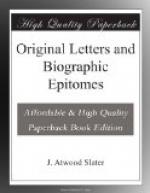The mould employed at all times is minutely fashioned, as a sculptor would, by investing his model with a code of spirituality, inspired with fire, which epicureanly endows fleeting emotion with a voice, and vitality lends also to distant-reaching invisible ends: hinting that the picturesque alchemy of music is potential too in reaching and touching the lower chords of animal passion, where movement is rapid and light redundant. The breast of the thoughtful writer heaved ever to animal instincts without measure in extolling the complex phases of court, ecclesiastic, and domestic oligarchy. Statesmanship and subjunction rise and peacefully sink together, and in his magnetic touch, are made to harmoniously coalesce in the political balance. Shorthouse the author, a believer in, a champion was of two-fold or dual cosmos: his colour sense being susceptible to and wrought upon in singular consular consistence with the effulgent dogmas of its creed, and in alliance with the spirit of the cinque cento Italian Renaissance Schools of Painting and Architecture. Practically speaking, he conceived a train of adept ideas, at times fanciful, and at times morbid, transforming them adroitly by adept excursions of cross-lit introspection, accentuation, and by dint of manual caress, as the first of players upon stringed instruments.
Music, I would apologetically infer, being the middle, the rallying feature, of Mr. J.H. Shorthouse’s verbose apology. If fictionizing in prose, he writes with brief orange-hued flashes of liquid ether; each of short, all but, brief span. Characteristically, he belongs to the same school and unapproachable law as the French organist-composer, C.M. Widor: stringent, petulant observance of free uncurbed metronome time, allied to picturesque handling; punctuality of tidal consort rigidly regarding, when each, the one to the other, linked; less a care, by virtuous intuition




